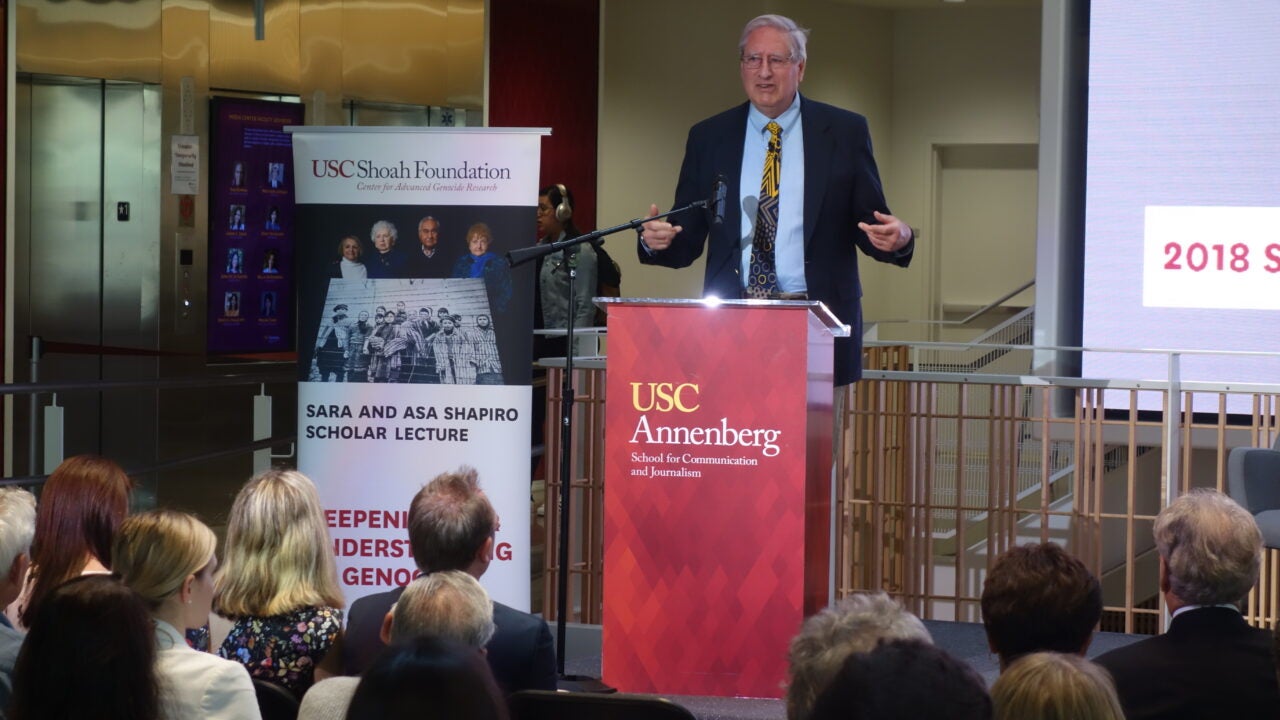Christopher Browning Talks About the Changing Attitudes of Witness Testimony in Genocide Studies

Despite the testimony of many witnesses to his Nazi-era crimes, Walther Becker walked out of a German courtroom a free man. The judge in the case – who was later revealed to have his own Nazi sympathies – gave little credence to survivor testimony when he handed down his 1972 verdict.
Historian Christopher Browning used Becker’s story as a springboard for his March 29 lecture about his research into a little-known Nazi labor camp in Poland and how the role of survivor testimony has evolved in the ensuing decades.
“The outcome of that trial was a judicial disaster and disgrace,” Browning said to an audience of several hundred gathered to hear his talk at Wallis Annenberg Hall.
Browning, the 2018 Sara and Asa Shapiro Scholar in Residence at USC Shoah Foundation’s Center for Advanced Genocide Research, talked about the changing attitudes about witness testimony and how the process of gathering it has changed since the end of World War II.
The lecture, “Holocaust History and Survivor Testimony: The Case of the Starachowice Factory Slave Labor Camp,” focused on the value – as well as some of the misconceptions – of witness accounts of history. Browning said that by combining traditional historical research with survivor testimony, he was able to assemble a more complete picture of life in the camp.
“I wanted testimony to provide me with enough evidence so I could write a historically accurate history of Starachowice slave labor camps,” he said. “Authenticity and accuracy were a double goal.”
Browning said that different ways of taking testimony provide unique perspectives for historians to use in their research.
Testimonies taken in the years immediately after the war are valued because they provide fresh memories and are highly detailed. There was very little testimony taken in the 1950s because the general consensus was that survivors needed to focus on the future and not the past. The 1960s saw the rise of judicial testimonies. These were conducted for court proceedings and were focused on evidence and conviction of perpetrators.
In the 1970s, testimonies tended to be free flowing, with little thought to chronology or structure. While filled with valuable information, these testimonies can be chaotic and hard to navigate.
With the founding of USC Shoah Foundation in 1994, the methodology of testimony changed once again. These interviews were standardized and covered survivors’ entire lives, not just during the Holocaust. Trained interviewers could keep survivors on track. Browning told about one testimony where the survivor barely touched on his experience at Starachowice, but after being prodded by the interviewer, he spoke on the topic for 40 minutes.
Browning also found that people were willing to share different kinds of memories during different periods in their lives. For instance, many survivors were uncomfortable talking about Jews killing other Jews for acts of betrayal, while others were reluctant to talk about sexual assault in the camps for decades.
“Only later did women talk about it,” he said.
But memories can change. One person’s memory can influence another’s. Reading something in a book can alter the way one remembers something. These are all challenges that Browning said can be largely overcome with rigorous research.
“Using survivor testimony has difficulties,” he said “It is problematic evidence. But all historical evidence is problematic in one way or another. Anybody who relies on uncomplicated evidence isn’t going to be able to write history. But the issue is not do we use it, but how do we use it. To not use survivor memories is to lose whole areas of the Holocaust that we have no other set of evidence for.”
________________________________________
Christopher Browning’s Lecture on the Use of Testimony in Genocide Research
Christopher Browning, the 2018 Sara and Asa Shapiro Scholar in Residence at USC Shoah Foundation’s Center for Advanced Genocide Research, talks about the changing attitudes about witness testimony and how the process of gathering it has changed since the end of World War II.